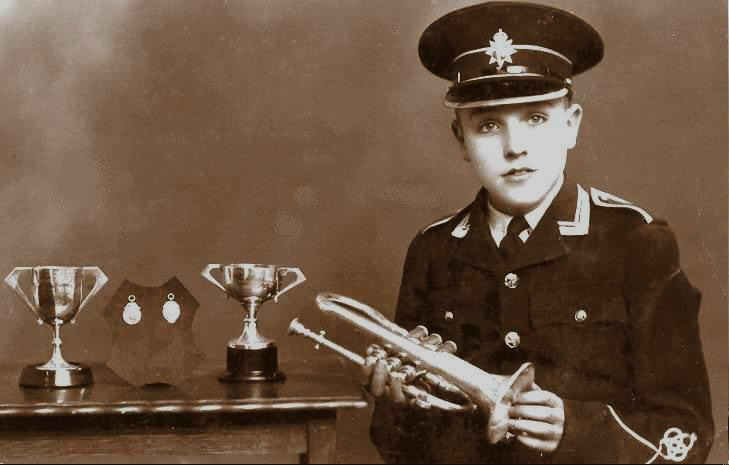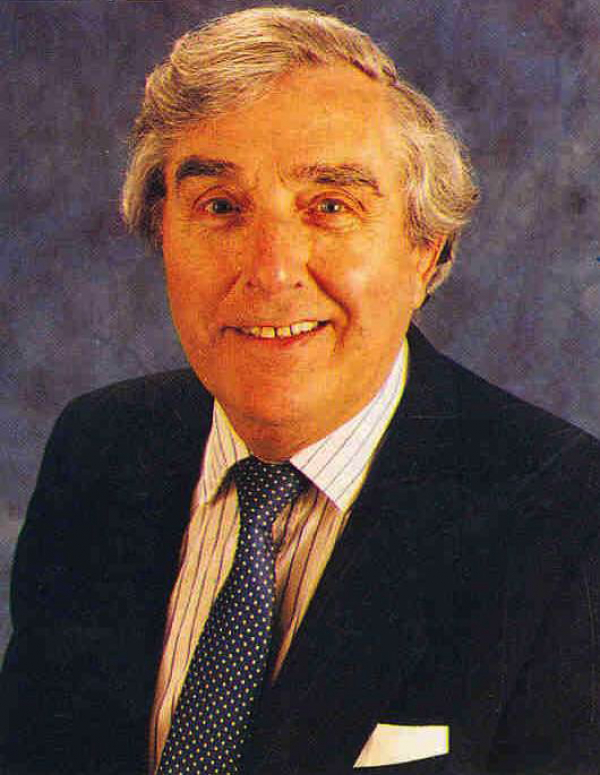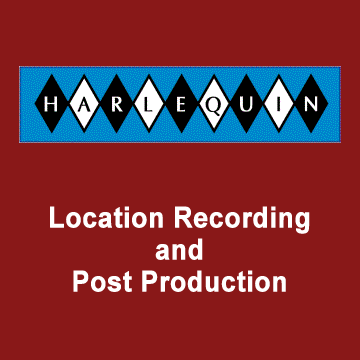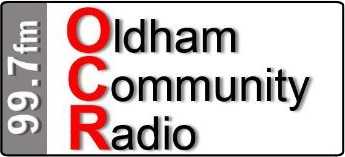|
It was as a young cornet player that he first heard Munn and Felton’s Band, playing their ‘lap of honour performance’ at the Crystal Palace in 1935 when nine-year-old James Scott said to his dad ‘…I want to play in that band…’ little did either he or his dad know at that time that within twelve years he would be their cornet soloist.
James was born in 1925 at Farnworth near Bolton and was born into a musical family. Whilst his father Archie was employed as a miner, he was also a member of the Bass section in the famous Besses o’th Barn Band. From his childhood days, James well remembers walking the eight miles regularly to Besses band room with his dad where he would sit and listen on a wicker basket. Enoch Jackson was their Principal Cornet in those days and on Solo Euphonium was Bert Sullivan. It was whilst watching Enoch Jackson that James said to his dad ‘I want to do that…’
He had his first cornet lesson with Herbert Brookes a local man, having received his first cornet on his eighth birthday. He made rapid progress, so much so that he was then given lessons by Clifton Jones, the famous Irwell Springs and Bickershaw Colliery Band Principal Cornet player.
At the age of nine, he was taken to join his first band the Ellenbrook and Boothstown Band and remembers going out carolling with them during the Christmas of 1933. At the ripe old age of ten, James was on the move when he joined the Eccles Borough Band, as their new 3rd cornet player. He was now a member of a band that for almost twenty years had competed alongside some of the leading bands in the brass band world at that time. It was in September 1935 that young James stepped on to the stage at the Crystal Palace to take part in his first National Brass Band Championships, playing Kenneth Wright’s test piece ‘Pride of Race’.
Life was tough during the 1930s particularly for mining families. In those uncertain times, miners would move from one community to another seeking work. James well remembers when he was 12 his family moved to Nuneaton where his father got a job working down the Griff Colliery and a place in their band. James became the Principal Cornet of the Ibstock United Band, a band which many years later became the nationally successful Desford Colliery Band.

As he got older, he continued to make excellent progress, in 1940 then aged 15 he was invited to be the Principal Cornet player with the City of Coventry Band under the baton of George Thompson.
In 1942, George Thompson left Coventry to take over as the Musical Director at Grimethorpe. It was after he had gone to Grimethorpe that George approached James’s father and asked him if he would bring him along to one of their rehearsals, that was in June 1942. After that rehearsal and at the age of 18 James was then appointed as the Principal Cornet for one of the brass band movements rising stars Grimethorpe Colliery Band.
It was, however, his eventual move to Munn and Felton’s Band in 1947 that developed him from being simply a good player into one of the foremost cornet players of his generation. It was whilst in this position that as their Principal Cornet he won the Cornet Championships of Great Britain in 1959 and 1960. Initially, he was second man to Hugh Higgins and played all the ‘stand up’ solos but musical director Stanley Boddington soon moved James onto the ‘…end chair’.
Looking back to those early years it all began with a telegram he received whilst playing with the Ransome and Marles Band, asking him to go for an audition at Munn and Felton’s. A telegram might sound rather grand but remember few householders had a telephone back in those days.
Arriving at Kettering on the following Saturday James played two solos for their conductor Stanley Boddington, the audition took place in what was called the Leather Room. James remembers being surrounded by roll upon roll of new leather waiting to be moved into the shoe factory. The smell of leather is something that has never left him, not just from that day of the audition but once having accepted the invitation to join the band he worked in that same room for the next ten years.

James Scott is a gentleman who believes self-praise is no praise; therefore, he considers it should be left to others to extol his virtues as a cornetist. His technique was flawless, his sound was sweetness itself, yet powerful and incisive when required. Sadly, only two recordings are illustrating his playing as a soloist - Del Staigers arrangement of ‘Carnival of Venice’ and ‘Silver Threads Amongst the Gold’ which had been arranged specially for James by Stanley Boddington. Both these solos were recorded in ‘one take’ at the famous EMI Abbey Road Studios where Munn and Felton’s recorded all the Bandstand series of records. His early retirement from playing particularly after winning the Solo Championship of Great Britain twice in 1958 and 1960 came as a shock to many people. It has been said many times since by commentators that his early retirement at the age thirty-five cheated us all of hearing the best of James Scott, cornetist.

In 1953 for a couple of years, James left Munn and Felton’s and joined a new band the J. H. Whites (Footwear) Band as its Principal Cornet. However, as a manufactured band it did not work out and by 1955 the band was closed down.
The spring of 1960, this saw the arrival of a letter from the managing director of Cammell Lairds at Birkenhead asking him if he would be interested in moving to become the musical director of their works band. This took a great deal of thought. It was a gamble of course with no guarantee of success, however, he decided to take the plunge, his desire to conduct a band had to start sometime.
He moved back north where he began what was to become a successful conducting career and at the same time, he was gaining valuable experience as a Trumpet player with the major northern symphony orchestras.
The Cammell Laird Band was in the third section when he first joined them as Bandmaster with Rex Mortimer as its Professional Conductor. James still thinks of it today as his apprenticeship into the world of conducting. Rex stayed a couple of years and then it was left to James, and gradually they began to improve.
James led the band to their first appearance in the National Finals at the Royal Albert Hall in 1964 when the test piece for that year was Gilbert Vinter’s ‘Variations on a Ninth’ when they played far beyond their expectations to come through and take 4th place behind GUS (Footwear) Band – (conductor Stanley Boddington).

The peak for James with the Cammell Laird’s Band was the following year when the test piece was Gilbert Vinter’s ‘Triumphant Rhapsody’ when they came through to take the runners-up prize behind the champions for that year Fairey’s and their conductor Leonard Lamb.
Further visits to the National Championships in London followed in 1966, 1967 and 1969. The band’s final visit to the Royal Albert Hall led by James was in 1970 (the test piece was Gordon
Jacob’s ‘Pride of Youth’). By this time shipbuilding was in decline and the Cammell Laird directors decided that band had to go.
Over his long and distinguished career, he has conducted many of the best British brass bands including Brighouse and Rastrick; Grimethorpe Colliery Band; Fodens, Wingates Yorkshire Imperial Metals Band and in 1972 he was with Rochdale Wilson’s Band.
Following the departure of Professor Walter Hargreaves after the 1972 National Finals, the search was on to find a replacement at Brighouse and Rastrick. In January / February of 1973, an approach was made to James. He made an impact immediately when he led the band to first place at the Royal Albert Hall on Hubert Bath’s test piece ‘Freedom’.

In 1975, following Brighouse and Rastrick’s success at becoming the Granada Band of the Year he left to take a similar position at Fodens Motor Works Band. His Midas touch soon followed when Fodens were crowned Champion Brass winners.
In 1977, James was awarded the ‘Iles Medal’ by the Worshipful Company of Musicians of the City of London in recognition of his contributions to the brass band movement.
The following year playing the Sir Arthur Bliss test piece ‘Checkmate’ he led Fodens into fifth place at the Nationals. He also took Grimethorpe Colliery Band to the Mineworkers Contest (areas) that same year and was back with them again in 1979 and stayed with them until 1980. In that same year, he led them at the British Open Championships to a creditable 6th behind winners Yorkshire Imperial Band playing ’Energy’. That same year at the Nationals playing ‘Carnival Overture’ Op92 they were awarded 4th place behind the winning band and one of his former bands Brighouse and Rastrick.
In 1984 sitting alongside William Relton and Sir David Willcocks was the first time James was invited to adjudicate at the National Finals at the Royal Albert Hall. The following year he was back at the Royal Albert Hall only this time he was conducting Yorkshire Imperial Metals Band and took them to a third place.

In 1986 James was once again at the helm of another famous band – Wingates who was then known as British Aerospace Wingates, but later that year he was back at Leeds and it was whilst conducting Yorkshire Imps that what can only be described as a conductor’s nightmare happened.

The band was performing at a prestigious concert in Warrington and the band having already gone to the concert platform left James in his dressing room waiting to be introduced by the compere. He left the dressing room as the band had now gone onto the stage. Suddenly he heard ‘…and presenting their musical director Mr James Scott…’ rather than waiting for James to arrive and see him in the wings and then introduce him James was still making his way from the dressing room to the stage and suddenly found himself lost in a maze of corridors and false trails to the stage. What seemed like forever, but was probably nothing more than a few seconds James found himself suddenly at the stage where the audience were quite oblivious to his plight but as James recalls it was plain to see the band were more amused about it than anyone else.
It was during the early 1990s that a unique band comprising of the older end of the brass band world was talked of and later formed. The conversation became more serious when the same people began putting a list of names together as possible people to invite to join such a band. The first thirty names were easy culminating in the birth of the ‘Kings of Brass’. Who should conduct such a musical team was probably the easiest task of all, which were the two names that meant so much to the older generation of brass band players and enthusiasts alike and can still command the respect of everyone today. Without a doubt, the two were James Scott and Geoffrey Whitham and during the seven years that James was associated with ‘Kings of Brass’ until the members decided to call it a day at their final concert in the Isle of Man in May 2001. He describes those years as a joy not only for the musical pleasure they all had from it but also the camaraderie and social pleasure than spending time again with old friends and colleagues.

Whilst James now spends much of his time adjudicating and conducting at band contests and music festivals at both home and abroad, his services are still in demand at the highest level. This year he has been invited to conduct the CWS (Glasgow) Band at both the British Open Championships and the National Championships which will mean that since those first tentative steps onto the Belle Vue stage at the British Open, the Crystal Palace in 1935 and the Symphony Hall in Birmingham in 2003 will see sixty-eight years something that has never been equalled.
With almost all his ambitions having been achieved from wanting to play with the Munn and Felton’s Band to being a freelance Symphony Orchestra trumpet player there is one non-musical achievement that his proud of. He left school at the age of 14 with few academic qualifications – something that he always regretted. However, at the age of 69, he saw an advertisement about the Open University and he began a study course at Liverpool University and after five years of painstaking hard work he stepped out with a degree in Art which had a major emphasis on both history and literature.
I am sure that his parents Archie and Annie would never have believed that one day not only would young James leave a lasting memory on the world of brass bands but would also graduate from a University with an arts degree, something that a poor mining family from Farnworth would ever have dreamt of happening to anyone in their family.
On behalf of everyone at Sunday Bandstand we send out sincere condolences to his family and close friends. RIP James ...
I wrote this story and it was published in 2003 and later I featured in my book 'What Brass Bands Did For Me' . Copies of this book are still available.
Chris
Email: This email address is being protected from spambots. You need JavaScript enabled to view it.
Website: www.chrishelme-brighouse.org.uk
|




























